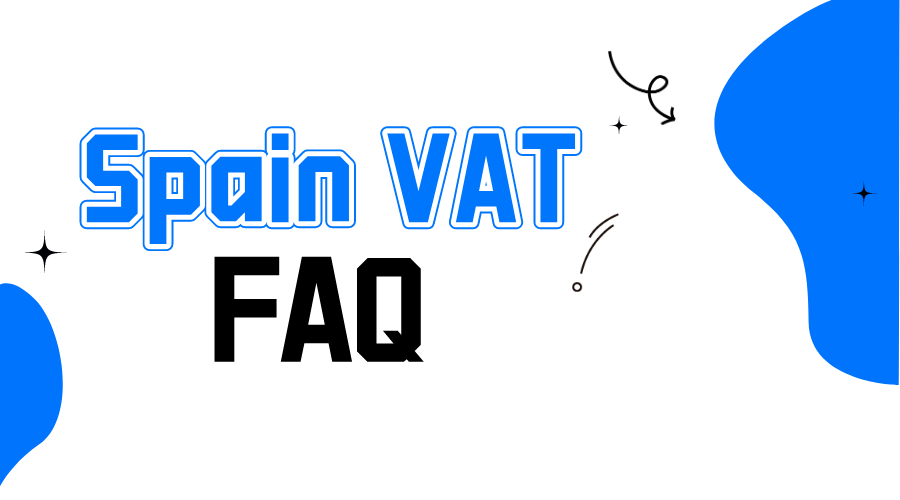Spain VAT FAQ

Spain VAT
The Spanish value-added tax (Impuesto sobre el valor anadido-IVA) system is similar to those established in the rest of the EU.
Value-added Tax (VAT) (Impuesto sobre el valor anadido-IVA) is an indirect and general consumption tax, assessed according to the added value of goods and services. It is ultimately borne by the final consumer and charged as a percentage of the price. Every consumer in Spain will have to pay.
The tax applies to business activities in Spain, including the production and distribution of goods and the provision of services. Some special cases are exempt from VAT.
Spain's VAT registration and VAT returns are based on legislation from the European Union, which sets out common VAT compliance rules across the EU. Spanish VAT law is contained in the General Tax Code. It is administered by the Agencia de Administracion Tributaria(Spanish tax or AEAT).
VAT rates
VAT—Value Added Tax—is a type of consumption tax applied on the sale of goods and services. In Spain, the percentage of VAT you pay depends on the kind of product or service you’re acquiring. While the general VAT rate is 21%, the reduced VAT rate is 10%, and the super-reduced VAT rate is 4%. Read on to see how these rates are applied.
|
Type of VAT |
VAT rate |
Applicable goods |
|
General VAT |
21% |
Appliances, cars, cinema tickets, smartphones, etc. |
|
Reduced VAT |
10% |
Cultural activities, transport and electricity |
|
Super-reduced VAT |
4% |
Necessities like essential foodstuffs and subsidized housing |
|
VAT free |
0% |
Masks and hand sanitizer, financial products and healthcare products |
General VAT
This is the most common of the three VAT rates and is applied by default to all goods and services not subject to reduced or super-reduced VAT rates. In little more than a decade, this rate has gradually risen from 16% to 21%. It applies to products and services such as:
- Footwear and clothing
- Fuel—including natural gas, gasoline, fuel-oil and diesel
- Beauty and cosmetic services—such as hairdressing, manicures and pedicures, hair removal, make-up, massages, body treatments, sunbed sessions, and tattoos
- Communication and telephone services and goods—like laptops, cell phones, phone bills, and internet access fees
- Alcoholic drinks and tobacco
- Furniture, furnishings, appliances and other house-related expenses
- DIY products
- Professional sports events
- Intermediate goods—materials and products used for manufacturing final products that will later be sold on the market,such as wood, steel, plastic, cement, bricks, commodities, coal, latex, oil, etc.
- Intermediate products for the manufacture of drugs, medical equipment, medical devices and instruments, and pharmaceutical products
- New and used cars
Reduced VAT
Just like general VAT, the reduced value-added tax is levied on the consumption of goods and services—albeit at a lower rate, 10%, than the general one. The reduced rate applies to the following products and services:
- Products used for producing human food and animal feed
- Hospitality and catering services—such as hotels, bars andrestaurants, spas, etc.
- Cultural activities—like entrance fees for museums, exhibitions, libraries, reference archives, and so on
- Public transportation—including domestic flights, and subway or train tickets
- Electricity—until recently, general VAT was levied on this energy source, but the recent rise in electricity prices has led the government to include it in the 10% bracket
- Farming and livestock products—animal feed, seeds, fertilizers, and herbicides
- Pharmaceuticals and feminine hygiene products—gauze, bandages, tampons, sanitary towels, and condoms
- Eye care products—including prescription glasses and contact lenses, eye drops, and spectacle frames
- Houses, garages, and outbuildings
- Funeral services
Super-reduced VAT
At 4%, the super-reduced VAT rate is the lowest value-added tax charged on products. It’s mainly used to tax goods considered by law as basic necessities:
- Essential foods—including bread and bread flours, eggs, fruits and vegetables, grains, cereals, and dairy products such as milk and cheese
- Sheltered housing projects, publicly-funded developments, and right-to-buy rental homes
- Prosthetic aids and implants, as well as wheelchairs and vehicles for disabled people and people with reduced mobility
- Pharmaceutical drugs for human use
- Telecare and homecare services for dependent adults
- Books, newspapers, and magazines that don’t mainly contain adverts (sales of the publication must account for 75% of its revenue)
VAT-exempt products
Certain services and products are not subject to value-added taxes in Spain. Under special circumstances, like the current health emergency, some items may be exempt from VAT, including:
- Masks, antibacterial gel, probes, syringes, thermometers, gloves, oxygen, protective goggles, etc.
- Postage stamps
- Financial and savings products and insurance
- Rental of sheltered housing used as a primary residence
- Education in public schools and authorized private schools, vocational training, private tutoring and language classes
- Healthcare services provided by medical professionals
Special rate change
The Spanish government has urgently passed the Royal-Decree 20/2022 on December 27, 2022 temporarily reducing the VAT rate of certain products, from January 1, 2023 until June 30, 2023.Below the list of the products concerned by these VAT reductions :
- Olive and seed oils, and pasta, will be charged at 5%, instead of 10%,
- The following products will be charged at 0% instead of 4%:
- Common bread, as well as frozen common bread dough and frozen common bread intended exclusively for making common bread, and bread flours,
- The following types of milk produced by any animal species: natural, certified, pasteurized, concentrated, skimmed, sterilized, UHT, evaporated and powdered,
- Cheeses and eggs,
- Fruits, vegetables, legumes, tubers and cereals, which have the status of natural products in accordance with the Food Code.
Note that the applicable tax rates will be 10% and 4%, respectively, as of May 1, 2023, if the interannual rate of underlying inflation for the month of March, published in April, is less than 5,5%.
The Budget Law 31/2022 of December 23, has also reduced the tax rate for feminine hygiene products, condoms and other non-medicinal contraceptives to 4%.
Spanish VAT registration
Foreign companies may register in Spain for VAT without the need to form a local company; this is known as non-resident VAT trading. There is no VAT threshold in Spain for the registration of non-resident traders; a VAT number must be in place before the commencement of taxable supplies.
There are strict rules on the situations where a registration is permitted. Common scenarios which require a Spanish VAT registration include:
- importing goods into Spain
- organising live events, conferences, etc, in Spain
- holding goods in a warehouse in Spain as stock for resale
- 'supply and install' services over 12 months
- selling goods from Spain to other EU countries
- distance selling to private individuals in Spain, e.g. internet retailing.
Registering for Spanish VAT generally takes 4 to 6 weeks, although this can vary.
Spanish VAT returns
Quarterly or monthly Spanish VAT returns must be completed by non-resident companies who are trading with a valid Spanish VAT registration . These provide details of their taxable supplies, and indicate the amount of VAT due to the Spanish tax office.
How often are Spanish VAT returns required?
The frequency of VAT reporting in Spain depends on the level of trading
- Quarterly VAT returns – sales below €6m for goods in the previous year
- Monthly VAT returns – sales above €6m for goods in the previous year
- Annual VAT returns – to be completed by all VAT registered businesses
However, in practice the tax authorities will apply their judgement.
What Spanish VAT can be deducted?
As well as declaring the Spanish VAT on any sales, the VAT return also lists VAT on purchases (inputs) that can be offset against the sales VAT due. This includes import VAT. Non-resident companies are allowed to reclaim such input VAT on the same basis as any resident company. Examples of VAT deductions include:
- Restaurant, hotel and travel costs if for the purposes of business
- Conferences and seminars
- 50% of parking costs
- Business gifts and entertainment are notallowable
- Advertising
- Import VAT
- VAT on the purchase of goods for resale
- VAT on capital expenditure
VAT refunds
Non-European individuals may apply to Spain for a refund of the VAT they have paid on purchases made while visiting Spain that they send or take home.
If this is your case, be aware that you should inquire about VAT refund procedures at the time of purchase. Refund procedures may differ from one case to another, but chances are that forms will need to be filled out when the goods are bought.
You should show your passport or identification papers for refund. The retailer will sign the form and return the VAT refund document. Your goods must be exported from the EU within 3 months after purchase, then you will be entitled to your VAT refund in the way you agreed with the retailer.
Not all shops operate the scheme for refunds, before buying goods you need to check that the retailer operates the Scheme, they do not have to do so, they will usually advertise if they do.
You cannot get refund of VAT on meals or services such as hotel accommodation, taxi fares etc. Furthermore, there are some taxable goods for which the Scheme is not applicable, as consumable items (e.g. perfume) etc.
VAT refunds are also important as regards European business expenses. It is necessary doing the paperwork and deal with the Spanish tax authorities to claim the refund.
Spanish VAT Compliance
Once registered for Spanish VAT, you will have to start following the local rules in a number of aspects. This includes:
- Issuing invoices with the disclosure details outlined in the Spanish VAT Law.
- Electronic invoiceswith proper signature, authenticity and agreement by the recipient.
- Maintenance of accounts and records, which must be held for at least 10 years.
- Correct invoicing of customers for goods or services in accordance with the Spanish time of supply VAT rules.
- Processing of credit notes and other corrections.
- Use of approved foreign currency rates.
Spanish VAT invoice requirements
Spanish VAT rules for invoices replicate those of the EU VAT Directive and its VAT invoice requirements.
Date of issuance and storage of Spanish invoices
Spanish VAT invoices must be issued at the time of the taxable supply for non-taxable persons. For taxable customers, they may be issued by the 16th of the month following the supply. Invoices must be stored for four years. As with all EU states, Spain permits the use of electronic invoices under certain conditions.
Spanish invoice requirements
Invoices must contain at least the following basic information:
- Date of issuance and of the transaction, if different
- A unique, sequential number
- VAT number of the supplier
- Full address of the supplier and customer
- Full description of the goods or services provided
- Details of quantities of goods, if applicable
- Unit prices, if applicable
- Details of any discounts provided
- The net, taxable value of the supply
- The VAT rate(s) applied, and the amount of VAT broken out by rate
- The gross, total amount of the invoice
- Where any foreign currency is used, the rates must be clearly identified
Simplified invoices for transactions below €400 may be issued.
